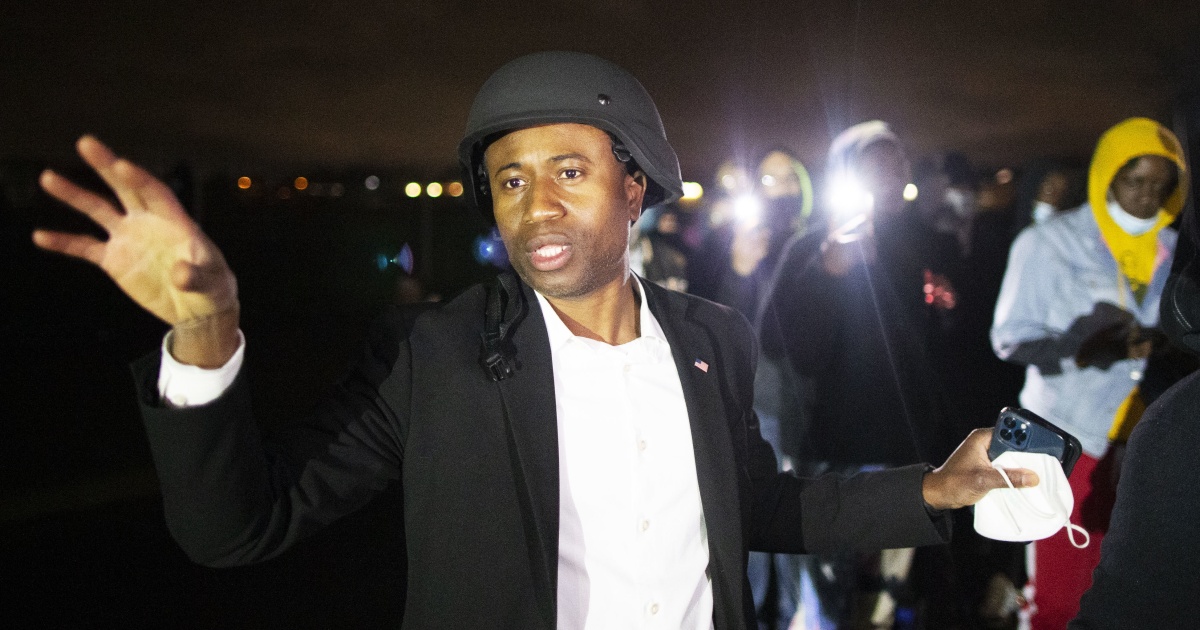
For many Liberian survivors of the civil wars that tore their African country apart, the Minneapolis suburb of Brooklyn Center was what New York City was to Jewish escapees of the Holocaust and what Chicago was to Poles exiled after World War II — a safe place to start over.
One of the Liberians who found a haven in Brooklyn Center is Mayor Mike Elliott, who was 11 when his grandmother spirited him out of Liberia.
Now, in the wake of the killing of Daunte Wright, who was Black, by a white police officer, Elliott faces the biggest challenge of his first term as he tries to lead Brooklyn Center through a crisis that threatens to shred the social fabric in one of Minnesota's most ethnically and racially diverse cities.
George Larson, a former principal of Brooklyn Center High School, met Elliott when he was a teenager and remains close to the mayor, who is 37 years old. He said Elliott is up to the challenge.
"He was born with the leadership gene," Larson said. "He always showed that kind of composure. And I think his classmates recognized his leadership qualities, because they elected him president of his 10th-, 11th- and 12th-grade class."
Thrust onto the national stage by Sunday's shooting, Elliott was quick to condemn the actions of Kim Potter, the former Brooklyn Center police officer charged with second-degree manslaughter for shooting Wright in the chest.
"We cannot afford to make mistakes that lead to the loss of life," Elliott said Monday. "I do fully support releasing the officer of her duties."
Elliott went out to try to calm the angry protesters waging a noisy demonstration outside the Brooklyn Center Police Department. On Monday, he took control of the police department after the City Council voted to give him "command authority."
"At such a tough time, this will streamline things and establish a chain of command and leadership," Elliott tweeted.
In short order, Brooklyn Center's city manager was fired and Police Chief Tim Gannon, who said Potter may have mistaken her pistol for her Taser when she shot Wright, resigned. Elliott said he would turn his attention to revamping the police department.
"As of this moment, I don't believe even one of our officers live in Brooklyn Center. That's something we are aware of," Elliott said Tuesday. "There is a huge importance to having a significant number of our officers living in the community they serve. It helps inform the culture of the department."
Elliott, who did not respond to requests for an interview, spent much of Wednesday contending with the fallout from the shooting of Wright, 20, who was killed after police pulled him over for driving with expired plates. They discovered that there was a warrant out for his arrest, and when Wright tried to flee, Potter shot him, police said.
Wright's death outraged the Black community and raised the already-high tensions in next-door Minneapolis, where former police Officer Derek Chauvin is on trial on second- and third-degree murder charges in the death of George Floyd, a Black man whose death last summer prompted protests across the country.
Elliott was part of the second wave of refugees who arrived in the U.S. in the mid-1990s from Liberia, which was founded by former American slaves who had returned to Africa.
About 35,000 Liberians live in Minnesota, according to the International Institute of Minnesota. Most of them migrated to Brooklyn Center and nearby Brooklyn Park, once all-white suburbs that have also become home to Hmong, Vietnamese and Somali immigrants.
Elliott was one of a number of Liberian students who arrived at his school after having "seen too much" of the brutal civil war, said Larson, who said he had never spoken to Elliott about what happened in Liberia.
"Other than escaping with his grandmother when he was 11, he has never said much about his experiences in Liberia, nor have I asked," Larson said. "I worked with a lot of students who witnessed a lot of bad things in Liberia, including torture, and I didn't ask them, either.
"I do know that his mother was already here when he got out," he said.
Larson said that they have stayed in regular contact over the years and that "I guess I've become sort of a father figure."
"His father was never part of his life," Larson said.
Elliott went on to graduate from Hamline University in St. Paul with a degree in international management and a minor in political science. He returned home to start a translation company and a tutoring nonprofit called Fastforward Education. He was elected mayor in 2018 on his second try, winning nearly 55 percent of the vote.
Elliott, the first person of color to be elected mayor of Brooklyn Center, was elated at his inauguration in 2019.
"We represent the future of Minnesota," Elliott told the mostly Liberian American crowd celebrating with him at the Brooklyn Center Community Center. "The impression I got from Brooklyn Center is this: We are a united people."
"center" - Google News
April 15, 2021 at 05:19AM
https://ift.tt/3a9TYaW
Brooklyn Center mayor, a Liberian refugee, faces defining moment in Daunte Wright shooting - NBC News
"center" - Google News
https://ift.tt/3bUHym8
https://ift.tt/2zR6ugj
Bagikan Berita Ini














0 Response to "Brooklyn Center mayor, a Liberian refugee, faces defining moment in Daunte Wright shooting - NBC News"
Post a Comment